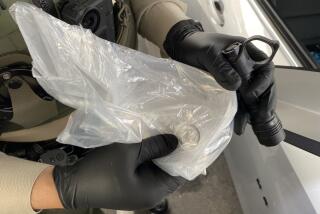Utah authorities suggest ankle bracelets for Alzheimer’s patients
Utah authorities think they have a valuable new use for the ubiquitous ankle bracelet: to locate missing patients with Alzheimer’s or dementia.
Officials in Davis County, about half an hour north of Salt Lake City, say the device, which typically monitors criminals on house arrest or parole, could be a cost-effective solution to a common problem.
“We think it’s just a different application for an existing technology,” Deputy Sheriff Kevin Fielding told the Los Angeles Times. “We run a jail here. We’ve had an electronic monitoring program already in place for years and years. So do the probation and parole people. Why not add to the list of the people the devices are used on?”
The department is seeking public response to the idea, he said, and has signed a contract with a supplier of the devices. Ankle bracelets, he said, cost $4 a day -- about $120 a month -- and could significantly reduce the time it takes to find a lost person. That’s where the savings come in; a search for a missing person can cost tens of thousands of dollars.
The idea isn’t exactly new: Healthcare and other companies offer tracking devices such as bracelets, necklaces or pocket-size locators for vulnerable individuals. One company website quotes a price of about $300, plus $30 a month for monitoring.
In a release on its website headlined “Ankle bracelets for the vulnerable,” the Davis County Sheriff’s Office said that many older residents in the county were “fragile and susceptible” and that when they wandered off, “sometimes the outcome is good, other times sadly the outcome is tragic.” The release added that the model being considered by the department uses smaller batteries and would be less obtrusive than those used on criminals.
“Say you call 911 and say, “Grandma just walked off, but I have a monitor provided by the Sheriff’s Office,’” Fielding told The Times. “We could then use that technology to get to people within 30 minutes rather than eight hours. The device would give GPS coordinates so we know right where to send officers. We don’t have to dispatch a search and rescue team to general neighborhoods with a vague idea on where to get things started.”
In the past, searches in northern Utah have required dozens of officers and the use of ATVs, snowmobiles and other equipment. Fielding said the bracelets also could be used for autistic children or anyone at risk of wandering off, adding that police would monitor the person’s movement only when the family contacted them.
Six in 10 people with Alzheimer’s wander off at some point, statistics show. In Utah alone, there are 32,000 people with Alzheimer’s and 10,000 more with other forms of dementia.
But not everyone thinks the bracelets are the proper solution.
Beth Kallmyer, vice president of constituent services for the Alzheimer’s Assn., told the Associated Press that patients don’t even want to wear location devices that look like bracelets or necklaces because they don’t want to be singled out.
“These are people that have a disease — they are not a criminals,” Kallmyer said. “We want to make sure we are protecting their dignity.”
But Fielding, a 30-year law enforcement veteran, told The Times that he thinks the devices could save lives. He said the department is awaiting community response before moving ahead with the project.
“Depending on who you ask, these elderly patients who wander away are a nationwide problem, not just in Utah,” he said. “If it happens to your family, then it’s a big problem, believe me.”
ALSO:
Arizona town poised to OK civil unions for same-sex partners
It’s the law in Colorado: Gun background checks, ammo limits
Westboro Baptist Church’s new neighbor: a rainbow-painted house
More to Read
Sign up for Essential California
The most important California stories and recommendations in your inbox every morning.
You may occasionally receive promotional content from the Los Angeles Times.











